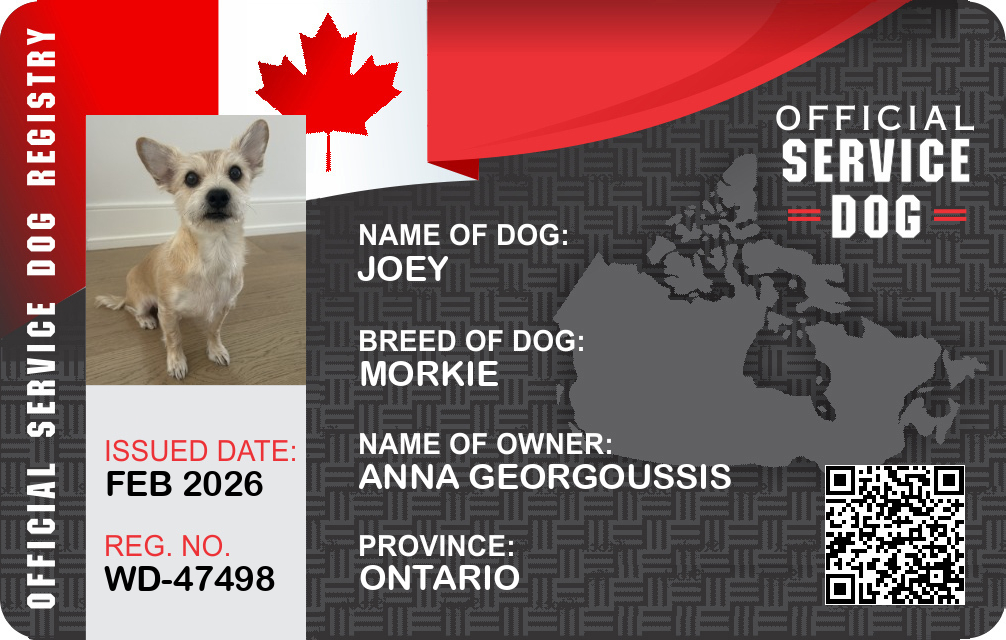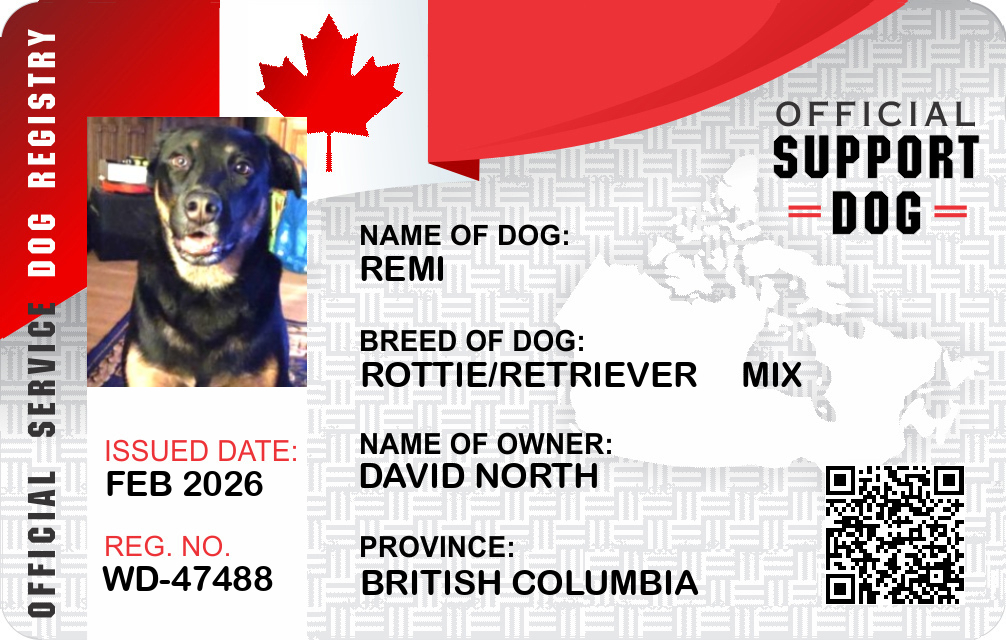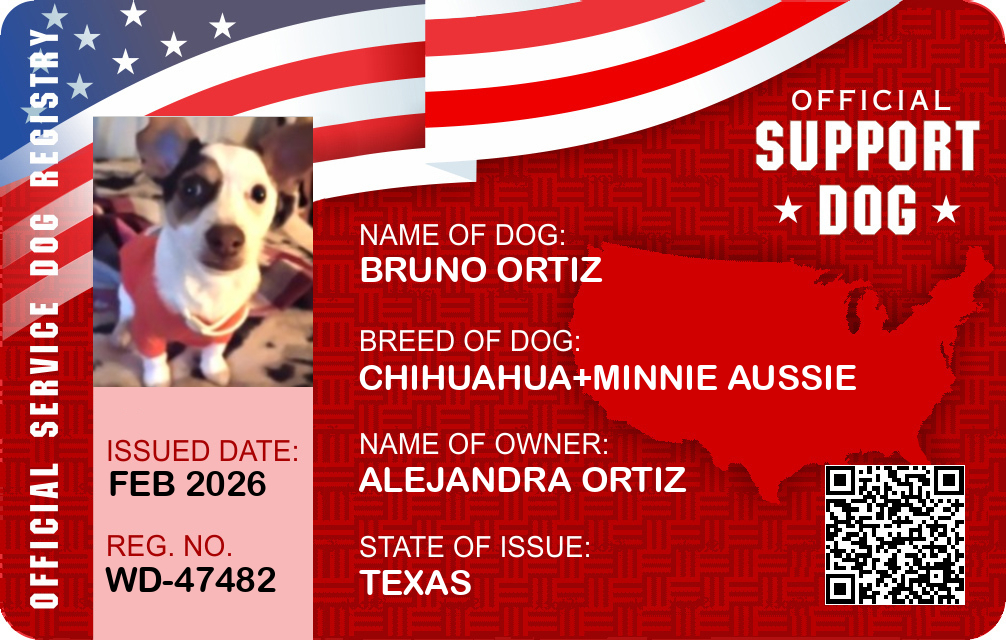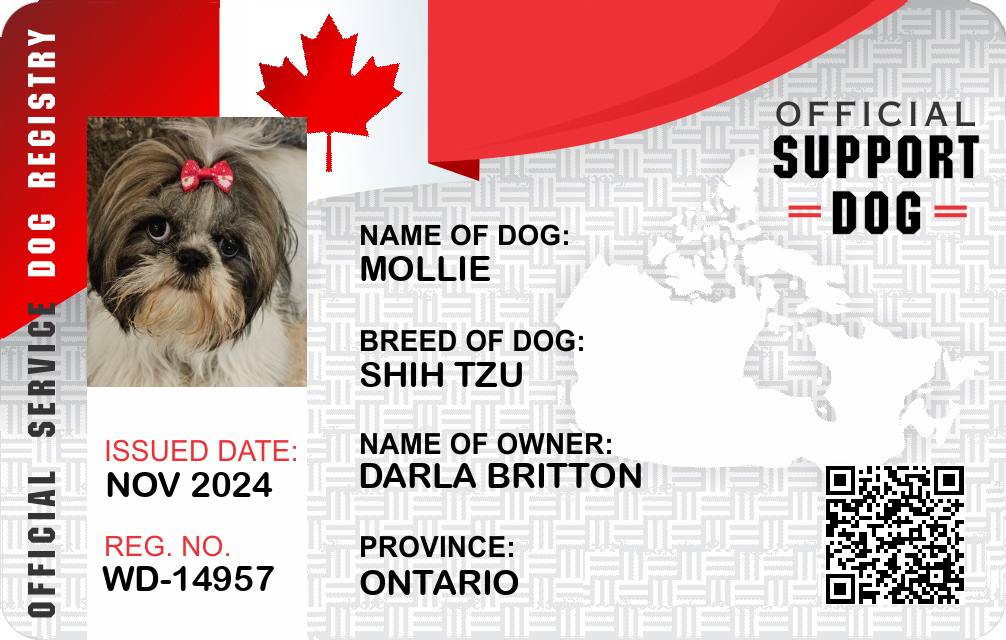South Carolina Service Dog Laws
Get Your Documents
Example State Cards

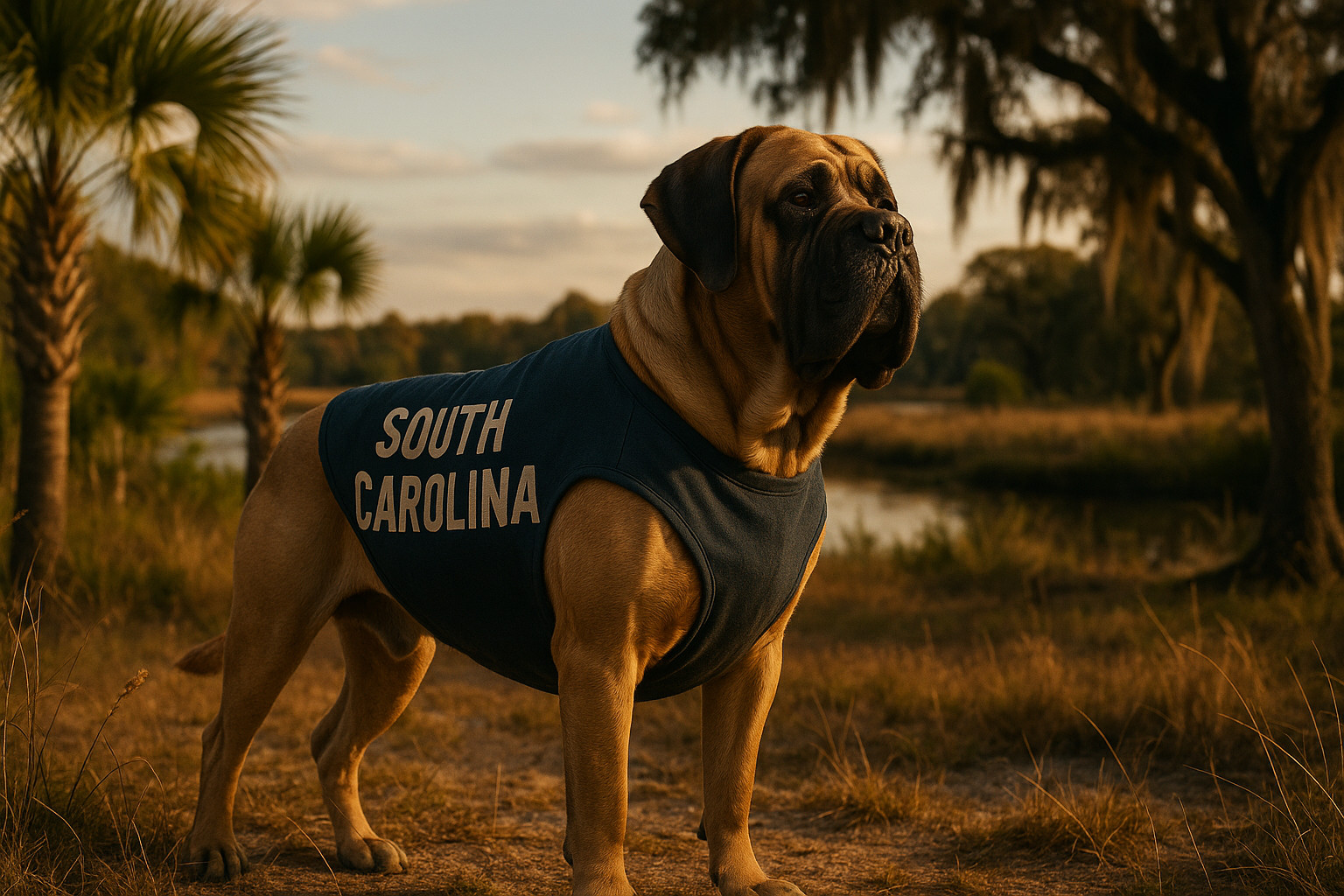
Overview of Service Dog and Legal Definitions in South Carolina
What is a Service Dog?
In South Carolina, a service dog is defined in alignment with the federal guidelines set forth by the Americans with Disabilities Act (ADA). A service dog is a dog that has been individually trained to perform tasks or do work for a person with a disability. These tasks must be directly related to the person’s disability, such as retrieving items, guiding individuals with impaired vision, or providing alerts for medical conditions like seizures or changes in blood sugar levels.
How Service Dogs Differ from Other Types of Assistance Animals
Service dogs differ from other assistance animals, such as emotional support animals (ESA), therapy animals, and comfort animals, primarily by the tasks they are trained to perform. While ESA and therapy animals provide comfort and emotional support, they are not trained to perform specific tasks to aid individuals with disabilities. Consequently, service dogs have broader access rights under the law, whereas ESA and therapy animals are typically limited to particular situations and facilities, such as housing under the Fair Housing Act.
Key Federal Laws Affecting Service Dogs (e.g., ADA, FHA, ACAA)
The primary federal laws that govern the use and rights of service dogs include:
- Americans with Disabilities Act (ADA): This law mandates that service dogs must be allowed to accompany their handlers into any area open to the public, ensuring full participation in society for individuals with disabilities.
- Fair Housing Act (FHA): Under the FHA, housing providers must make reasonable accommodations for service animals and ESA, even in properties with no-pet policies, ensuring equal housing opportunities for individuals with disabilities.
- Air Carrier Access Act (ACAA): This law governs the use of service animals in air travel, allowing passengers with disabilities to travel with their service dogs in the cabin of airplanes, albeit with specific regulations and documentation required by airlines.
These laws provide a uniform framework that South Carolina adheres to while adding state-specific nuances to consider.
State-Specific Service Dog Laws in South Carolina
Housing Rights and Responsibilities
In South Carolina, individuals with disabilities who use service dogs are protected under both federal and state housing laws. Landlords must provide reasonable accommodations to service dog handlers regardless of no-pet policies, ensuring the right to fair access to housing. It is, however, permissible for landlords to request documentation or verification if a tenant’s need for the service dog is not obvious. Landlords cannot charge additional fees or deposits specifically for service dogs, although handlers are responsible for any damages caused by the animal.
Public Access and Accommodation
Service dogs have the right to accompany their handlers in all public spaces and facilities, including restaurants, hotels, stores, and public transportation, as mandated by the ADA. In South Carolina, businesses and public entities may ask if the dog is required because of a disability and what tasks it has been trained to perform, but they cannot require documentation or verify the disability’s nature.
Transportation and Travel Rules
For transportation and travel, South Carolina follows federal guidelines established by the ADA and ACAA. Service dogs can accompany their handlers on public transportation and within public areas of airports. Documentation requirements may vary, especially for airline travel where airlines might require advanced notice and documentation of the dog’s training and behavior. Service dogs must not occupy an aisle or interfere with emergency evacuations in any public transport scenario.
Employment and Workplace Considerations
The ADA’s regulations for employing service dogs apply within South Carolina workplaces. Employers must provide reasonable accommodations for employees with disabilities who rely on service dogs, unless doing so causes undue hardship on the business. Employees should discuss accommodation needs with their employer, who may require documentation of the disability and the necessity of the service dog. Open communication helps ensure the needs are balanced appropriately.
Documentation, Requirements, and Processes in South Carolina
Service Dog Documentation and Who Can Issue It
While the ADA does not mandate service dog certification or identification, having current documentation can help service dog handlers navigate potential disputes. Acceptable documentation may include proof of the dog’s training and verification of the handler’s disability. Documentation often comes from licensed medical professionals or accredited service dog training organizations. In South Carolina, while no state-specific certification is required, maintaining organized records is advisable, including a summary of the dog’s training and health records.
Landlord, Business, and Provider Verification Rules
Entities in South Carolina, such as landlords or businesses, can inquire about a service dog’s function but cannot demand certificates or proof of training under the ADA. They may, however, request verification of an accommodation need, such as a note from a healthcare provider, solely in housing situations. Understanding these restrictions on information requests helps protect privacy and prevent discrimination.
Rights, Limitations, and Legal Risks
Rights Service Dog Handlers Have in South Carolina
Service dog handlers in South Carolina have the right to full and equal access to public accommodations, additional housing protections, and the ability to include service dogs in the workplace with necessary accommodations. Access rights ensure inclusivity in participating in various daily activities and societal engagements, similar to non-disabled persons. These rights are foundational for upholding the dignity and agency of those with disabilities.
Limits on Service Dog Protections and Common Restrictions
Despite broad protections, service dog access rights are not limitless. Handlers must maintain control of the service dog and ensure it is well-behaved, as disruptive or aggressive dogs can be lawfully excluded. Businesses can deny access if a dog’s behavior poses a direct threat to safety or fundamentally alters the goods or services offered. Additionally, service dogs are not permitted to enter sterile or controlled areas, like some parts of hospitals or zoos.
Penalties for Fraud or Misrepresentation
South Carolina, like other states, imposes penalties for anyone misrepresenting a pet as a service dog. Fraudulent representation undermines legitimate service dog use and can lead to community and legal consequences. Such behavior may result in fines or community service requirements, emphasizing the importance of integrity and honest representation in service dog usage.
Practical Guidance for Service Dog Handlers in South Carolina
How to Qualify for a Service Dog Legitimately
Qualifying for a service dog begins with a diagnosis of a disability recognized under the ADA. Individuals should consult with medical professionals to establish a legitimate need and ensure they meet all criteria for service dog utilization. Identifying specific tasks that a service dog can help with is essential in justifying the necessity of such an animal. Obtaining a service dog often involves contacting a reputable training organization or embarking on a self-training process if resources allow.
How to Talk to Landlords, Airlines, and Employers
Effective communication with landlords, airlines, and employers involves clear, factual presentation of one’s rights and needs. When discussing accommodations, present any necessary documentation succinctly. For landlords and employers, verbal or written requests for accommodations should be accompanied by notes from healthcare providers. With airlines, advanced notification of traveling with a service dog can help ensure a smooth process, avoiding misunderstandings at the airport or on the aircraft.
Summary of Service Dog Laws in South Carolina
- Full public access rights: Guaranteed under ADA, inclusivity in housing, public accommodations, and workplaces.
- Reasonable accommodation requirements: In housing, employment, and public transport, consistent with federal guidelines.
- Documentation clarity: Essential for housing and air travel; maintain organized records for seamless engagements.
- Misrepresentation penalties: Legal risks for fraud; emphasize integrity in service dog representation.
- Open communication: Ensures fairness in accommodations and respectful interactions with landlords, airlines, and employers.
By understanding and adhering to these guidelines, service dog handlers in South Carolina can confidently navigate their rights and responsibilities. Through education and awareness, we foster a more inclusive and accommodating environment for individuals who rely on service dogs to contribute fully to society.
Get Your Documents
Example State Cards





